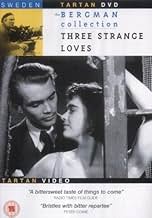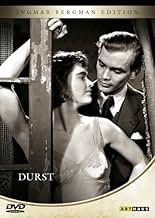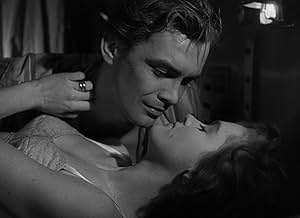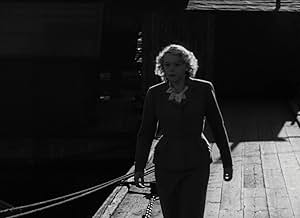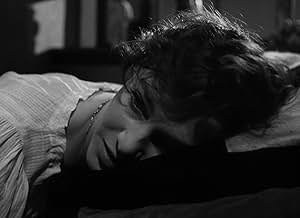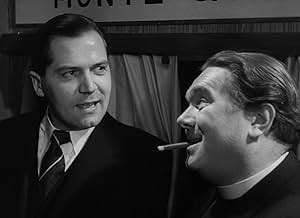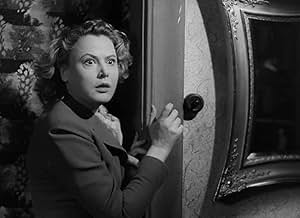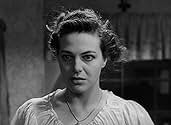ÉVALUATION IMDb
6,5/10
3,1 k
MA NOTE
Ajouter une intrigue dans votre langueA needy couple in a bad marriage travel back to Stockholm after a trip to Italy. Meanwhile, a widow resists seductions from two different persons - her psychiatrist and a lesbian friend.A needy couple in a bad marriage travel back to Stockholm after a trip to Italy. Meanwhile, a widow resists seductions from two different persons - her psychiatrist and a lesbian friend.A needy couple in a bad marriage travel back to Stockholm after a trip to Italy. Meanwhile, a widow resists seductions from two different persons - her psychiatrist and a lesbian friend.
- Director
- Writers
- Stars
Mimi Nelson
- Valborg - Ruts kamrat i balettskolan
- (as Mimmi Nelson)
Wiktor Andersson
- Doorkeeper
- (uncredited)
Verner Arpe
- Tysk biljettsamlare
- (uncredited)
Ingmar Bergman
- Tågpassagerare
- (uncredited)
Britta Brunius
- Sjuksköterskan efter Ruts abort
- (uncredited)
Calle Flygare
- Den danske prästen på tåget
- (uncredited)
Inga Gill
- Lady at Hotel
- (uncredited)
Herman Greid
- Stadsbudet i Basel
- (uncredited)
Helge Hagerman
- Den svenske prästen på tåget
- (uncredited)
Avis en vedette
Interesting film, but this is clearly not the very best of the great Bergman. Several relationships are examined under the microscope (so far, so Bergman). The film jumps around between the relationships in a slightly distracting way, but eventually you get to the bottom of who used to be with whom etc.
Gosh it's bleak out there, Bergman seems to share Strindberg's views on marriage and relationships at this time - the references to Strindberg stress that point. There's adultery, bitter rows between partners, lesbianism (inexplicit) and suicide. It ought to have me at the edge of my seat, but somehow doesn't quite do the business for me in the way that most Bergman films do. Perhaps this one hasn't aged well.
Worth seeing for the dedicated Bergman fan - it's pretty short and has its moments. If you are looking for an initial view of Bergman, look elsewhere.
Gosh it's bleak out there, Bergman seems to share Strindberg's views on marriage and relationships at this time - the references to Strindberg stress that point. There's adultery, bitter rows between partners, lesbianism (inexplicit) and suicide. It ought to have me at the edge of my seat, but somehow doesn't quite do the business for me in the way that most Bergman films do. Perhaps this one hasn't aged well.
Worth seeing for the dedicated Bergman fan - it's pretty short and has its moments. If you are looking for an initial view of Bergman, look elsewhere.
While Ode to Joy is undoubtedly the gem of Eclipse's Early Bergman box set, Thirst is a close second, at least in my mind. It's kind of a precursor to Scenes of a Marriage, where the story follows a married couple (played by Eva Henning and Birger Malmsten) on a train trip through war-torn Europe. The tumult of the film comes not from the mostly ignored outside world, but from the rocky marriage itself. We also get glimpses of the couple's former lovers. The film is at its best when sticking to the couple. When it strays to the stories of side characters, it's weaker. Since the film is so short (just over 80 minutes), you have to wonder if some of the tangential stories were added as padding. But even the scenes that don't add much are well written, acted and directed. Henning gives a masterful performance, and Bergman was really coming into his own by this point.
I thought I had seen every Bergman film ever made, so I was thrilled to stumble onto this one the week after he died. I had no trouble following the intertwining stories because I kept track of the characters' names and their relationships. So what confused many viewers seemed totally justified, especially compared to films in our post-Altmam era where more and more we see "stories" where seemingly unconnected people's lives crisscross and are junxtaposed ("Magnolia," and "Babel" to name a few).
The filming is fantastic for the time and prefigures the use of close ups in "Through a Glass Darkly." Very different from "Port of Call" just before and "To Joy" just afterwards. I found the film less bleak than "Prison," its lyrical moments prefiguring "Summer Interlude," one of my favorite early Bergmans.
The lesbianism was blatant enough for me, much more obvious than in "Young Man With A Horn," made around the same time in the US. Curiously, this section of the film helped illuminate Bergman's use of the theme in "The Silence," and this makes me want to view that film again. The fact that this is a film Bergman didn't write is intriguing, because he harmonizes his visual language to the rhythms of the screenwriter's oral one. The dialog was rather light for the seriousness of the situations. Perhaps Bergman himself would have been heavier-handed.
Lastly, there are the actresses, and here Bergman's direction of actors seems to solidify, as I find his previous films much more uneven on this score. Here the women, especially the young dancer, show real depth.
Keep in mind that this is not his first film, but still an early work, a seed that will grow into later masterpieces. Then you won't be disappointed, even after the mediocre last minutes of a work that definitely showed promise.
The filming is fantastic for the time and prefigures the use of close ups in "Through a Glass Darkly." Very different from "Port of Call" just before and "To Joy" just afterwards. I found the film less bleak than "Prison," its lyrical moments prefiguring "Summer Interlude," one of my favorite early Bergmans.
The lesbianism was blatant enough for me, much more obvious than in "Young Man With A Horn," made around the same time in the US. Curiously, this section of the film helped illuminate Bergman's use of the theme in "The Silence," and this makes me want to view that film again. The fact that this is a film Bergman didn't write is intriguing, because he harmonizes his visual language to the rhythms of the screenwriter's oral one. The dialog was rather light for the seriousness of the situations. Perhaps Bergman himself would have been heavier-handed.
Lastly, there are the actresses, and here Bergman's direction of actors seems to solidify, as I find his previous films much more uneven on this score. Here the women, especially the young dancer, show real depth.
Keep in mind that this is not his first film, but still an early work, a seed that will grow into later masterpieces. Then you won't be disappointed, even after the mediocre last minutes of a work that definitely showed promise.
The early Bergman films are interesting in how they portray an artist evolving with increased experience. They're not always successful artistic endeavors overall, but they show how a studio system can foster and hone talent through experience.
Thirst tells the story of a young married couple on their way back from a vacation in Italy. We see them in France as they are about to board a train through 1946 Germany back towards Sweden. The woman is haunted by a previous affair and a subsequent abortion all while she nurses a bad knee in the hopes that one day she will dance ballet again. The husband is a penny pinching academic obsessed with coins and who had had an affair with another woman out of, what he calls, pity for her status as a widow. None of this is a secret, all of the sins are out in the open.
The two have the kind of talks typical in Bergman films (in particular his later, post-existential films like Scenes from a Marriage) and come to the conclusion that they should reconcile their differences and try to work through their problems to a happy marriage in the film's final moments.
The problem with the movie is its structure. This could be a case study in a poorly structured story pretty much killing a film. The first twenty minutes are dedicated to flashbacks to the wife's affair with a lieutenant in the Swedish military before we ever meet the husband. The husband's lover is first mentioned about thirty minutes into the movie, and she is introduced a few minutes later in a scene with her cruel psychologist. She then disappears for a half hour. There's also the wife's old dancing friend who appears in another flashback and then shows up with the husband's former lover, trying to seduce her which ends up leading to the lover's suicide.
The problem isn't the events themselves, but the fact that they are bunched together without any real effort to weave it in and out of the other threads. As typical, I read the essay in the Criterion Collection's large book and was unsurprised to discover that the script (which Bergman didn't write) was based on a series of short stories. Considering my issues with the film's structure, it made perfect sense. It felt very staccato with one story going through its beginning, middle, and end before another one took over. It's not quite that, but, especially considering the initial twenty minutes with the wife's lover, it feels very apropos.
I do think that if the movie had been re-arranged it would have worked better. I don't think it's something that purely an editing job would have done. At least some of it would have needed to originate at the script. The husband's lover needed at least one more scene to flesh her out for instance (her first scene with the psychologist is highly emotionally delivered and feels out of place because we had never met her before).
Stylistically, the movie feels very Bergman. The topics he loved are there (the marriage, even the dancer is a performer that he frequently featured). His visual style sometimes feel a little more active than normal, but we clearly see his visual tics such as two people in frame talking to each other, letting actors demonstrate who they are through long exposures to their smaller actions, and strong performances throughout. I just wish the story had been arranged in a way that made sense.
Thirst tells the story of a young married couple on their way back from a vacation in Italy. We see them in France as they are about to board a train through 1946 Germany back towards Sweden. The woman is haunted by a previous affair and a subsequent abortion all while she nurses a bad knee in the hopes that one day she will dance ballet again. The husband is a penny pinching academic obsessed with coins and who had had an affair with another woman out of, what he calls, pity for her status as a widow. None of this is a secret, all of the sins are out in the open.
The two have the kind of talks typical in Bergman films (in particular his later, post-existential films like Scenes from a Marriage) and come to the conclusion that they should reconcile their differences and try to work through their problems to a happy marriage in the film's final moments.
The problem with the movie is its structure. This could be a case study in a poorly structured story pretty much killing a film. The first twenty minutes are dedicated to flashbacks to the wife's affair with a lieutenant in the Swedish military before we ever meet the husband. The husband's lover is first mentioned about thirty minutes into the movie, and she is introduced a few minutes later in a scene with her cruel psychologist. She then disappears for a half hour. There's also the wife's old dancing friend who appears in another flashback and then shows up with the husband's former lover, trying to seduce her which ends up leading to the lover's suicide.
The problem isn't the events themselves, but the fact that they are bunched together without any real effort to weave it in and out of the other threads. As typical, I read the essay in the Criterion Collection's large book and was unsurprised to discover that the script (which Bergman didn't write) was based on a series of short stories. Considering my issues with the film's structure, it made perfect sense. It felt very staccato with one story going through its beginning, middle, and end before another one took over. It's not quite that, but, especially considering the initial twenty minutes with the wife's lover, it feels very apropos.
I do think that if the movie had been re-arranged it would have worked better. I don't think it's something that purely an editing job would have done. At least some of it would have needed to originate at the script. The husband's lover needed at least one more scene to flesh her out for instance (her first scene with the psychologist is highly emotionally delivered and feels out of place because we had never met her before).
Stylistically, the movie feels very Bergman. The topics he loved are there (the marriage, even the dancer is a performer that he frequently featured). His visual style sometimes feel a little more active than normal, but we clearly see his visual tics such as two people in frame talking to each other, letting actors demonstrate who they are through long exposures to their smaller actions, and strong performances throughout. I just wish the story had been arranged in a way that made sense.
Bergman is beginning to develop some of his personal traits to be found in the later, more mature film. He hasn't yet learned to unveil the characters quite yet but the interactions are quite interesting. There are several stories going on here and a couple of groups of characters and sometimes the switching back and forth can be confusing. I would certainly agree with one reviewer that "thirst" was used not only metaphorically throughout but quite literally from the first image of an eddy of water during the credits to the very end. The characters are always drinking something or other - water (it's midsummer after all), wine(one of the characters is an alcoholic), even milk. The characters are actually quite self-centered, as in so many of Bergman's earliest films, and not particularly likable. The scene with the "therapist" was especially disturbing and the characters seem more prone to bounce off each other than anything. It's when they start to communicate that the trouble really begins to brew as we've learned from the later films.
Curtis Stotlar
Curtis Stotlar
Le saviez-vous
- AnecdotesThe first of three theatrical films directed by Ingmar Bergman that he did not write.
- Autres versionsThe Tartan region 2 DVD restores the ending of the scene between Viola and her lesbian former schoolmate Valborg, in which the latter tries to seduce the former by getting her drunk. This had been cut by the Swedish censors before the film's original release and had never been seen publicly before 2004.
- ConnexionsReferenced in Dårskapens hus (1951)
- Bandes originalesNon più andrai
(uncredited)
from "Le nozze di Figaro"
Music by Wolfgang Amadeus Mozart
Swedish Lyrics by Bernhard Crusell
Sung by Bengt Eklund
Meilleurs choix
Connectez-vous pour évaluer et surveiller les recommandations personnalisées
- How long is Thirst?Propulsé par Alexa
Détails
- Durée
- 1h 23m(83 min)
- Couleur
- Rapport de forme
- 1.33 : 1
Contribuer à cette page
Suggérer une modification ou ajouter du contenu manquant

